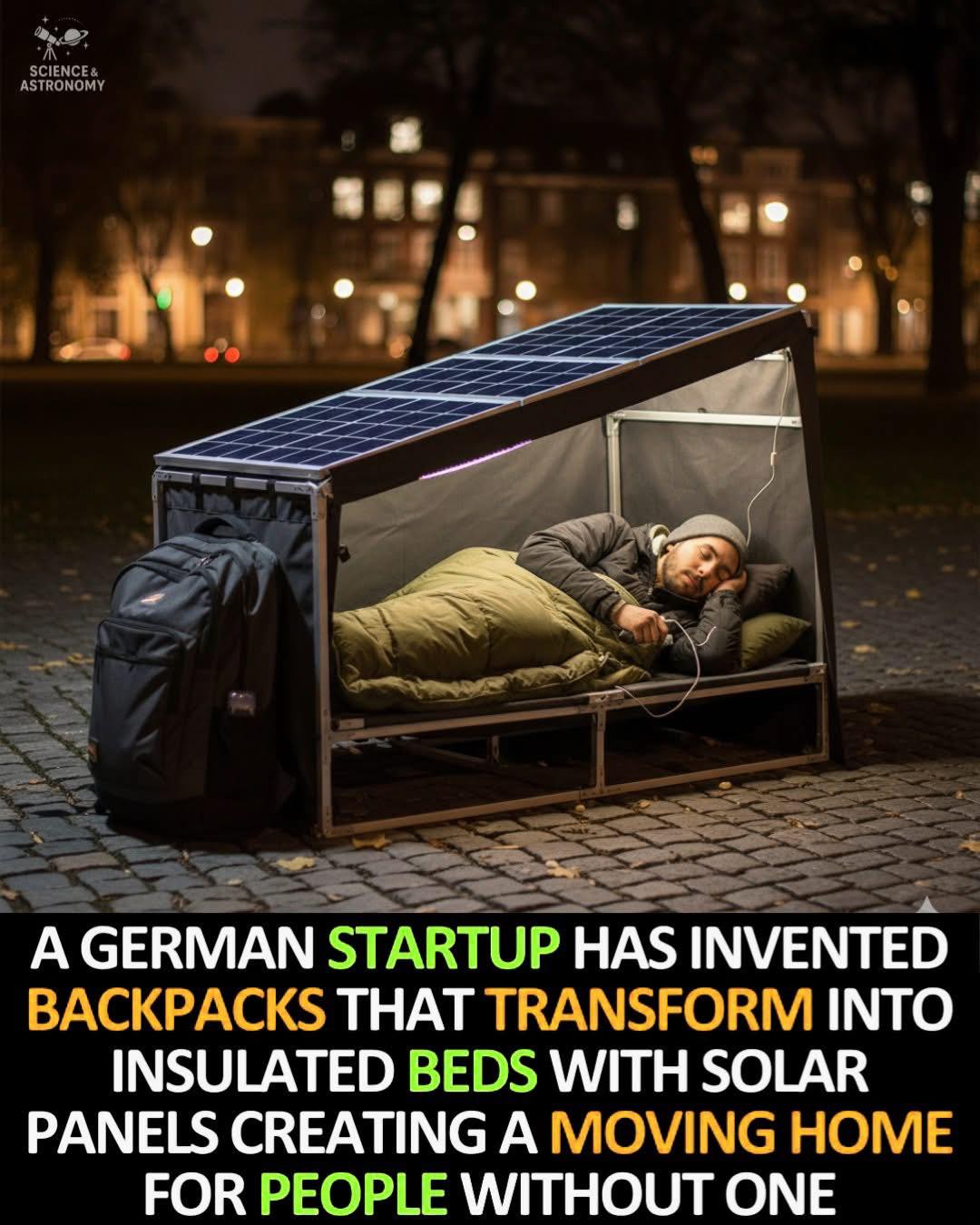>> See product: https://amzn.to/3XUtYc0 <<
A Small Idea with a Big Purpose
In the heart of Germany, a group of young innovators decided to take on one of society’s most persistent problems — homelessness. Their mission wasn’t to create another gadget or app for convenience, but to design something that could change real lives.
From that ambition came an extraordinary idea: a backpack that can unfold into a bed, insulated for warmth and powered by solar energy. This unique invention offers a practical, sustainable, and mobile shelter solution for people living without a home.
The startup behind this project was founded by a team of designers, engineers, and social entrepreneurs who believe that technology should serve humanity first. Their goal was to prove that innovation doesn’t have to be luxurious — it can be humane.
>> See product: https://amzn.to/3XUtYc0 <<
The Challenge: Life Without Shelter
Across Europe, more than 700,000 people experience homelessness on any given night, according to FEANTSA (the European Federation of National Organisations Working with the Homeless). The issue isn’t limited to large cities — smaller towns are also seeing a rise in people sleeping rough due to economic instability, job loss, or family crises.
During winter, the risks become deadly. Exposure to freezing temperatures, rain, and wind often leads to illness or even death. Many homeless individuals also face the loss of dignity, security, and hope.
This grim reality inspired the German startup to find a simple yet powerful solution: how to give mobility, warmth, and energy independence to those who need it most.
The Invention: A Backpack That Becomes a Home
At first glance, the invention looks like an ordinary backpack. But when unfolded, it transforms into a compact, insulated bed with a small roof — essentially a personal micro-shelter.
Here’s what makes it remarkable:
-
Portable and Lightweight: The entire structure folds neatly into a backpack-sized unit that one person can carry.
-
Solar Power Integration: Solar panels on top collect sunlight during the day to power LED lights and USB charging ports at night.
-
Insulated and Weatherproof: The sleeping compartment is made from water-resistant, thermal materials, helping users stay warm and dry in cold weather.
-
Energy Efficiency: A small battery stores solar power, allowing users to charge a phone or use light for several hours.
-
Quick Setup: It can be unfolded and assembled in just a few minutes without any tools.
In short, this backpack isn’t just a sleeping bag or tent — it’s a mobile home powered by clean energy.
>> See product: https://amzn.to/3XUtYc0 <<
Designed for Dignity and Safety
What sets this invention apart from other temporary shelters is its human-centered design. Every element was developed after interviewing and observing homeless individuals in German cities like Berlin and Hamburg. The team learned that safety, privacy, and portability were top priorities.
To address these needs, the shelter includes:
-
A semi-transparent cover for privacy while maintaining ventilation.
-
A lockable compartment for personal belongings.
-
Reflective safety strips for visibility at night.
-
Thermal insulation to trap heat effectively without requiring electricity.
This thoughtful design gives people something more than just physical protection — it gives them a sense of dignity. It’s a reminder that even small innovations can help restore hope.
>> See product: https://amzn.to/3XUtYc0 <<
Sustainability Meets Humanity
Beyond its humanitarian purpose, the transforming backpack aligns with sustainable design principles. It uses renewable solar energy and recyclable materials, ensuring minimal environmental impact.
Unlike traditional shelters that depend on city infrastructure or electricity, this backpack offers energy independence. Users can charge phones, flashlights, or medical devices directly from the built-in solar panel — a crucial feature for safety and connection in the modern world.
The creators emphasize that sustainability shouldn’t only apply to the environment — it should also extend to social sustainability, ensuring that progress benefits everyone, especially those most in need.
The Team Behind the Innovation
The project was launched by a group of university students and young engineers who collaborated with non-profit organizations and local shelters in Germany. Their motivation came from witnessing how many people struggled to survive winter nights without basic protection.
With the help of crowdfunding campaigns and local grants, the team built several prototypes and tested them in real conditions. Feedback from homeless users helped improve durability, comfort, and usability.
The startup continues to work with NGOs and government partners to distribute these backpacks across German cities. Their long-term goal is to expand production internationally and make the design open-source so other countries can replicate it.
>> See product: https://amzn.to/3XUtYc0 <<
Social Impact and Global Potential
The impact of this invention reaches beyond Germany. The concept of portable, solar-powered micro-homes could be applied globally, especially in regions facing:
-
Homelessness due to housing crises
-
Natural disasters and refugee displacement
-
Humanitarian emergencies
By merging affordable design with renewable technology, this idea could redefine how we approach emergency housing and disaster relief.
Imagine disaster zones where victims receive backpacks that double as shelters, or refugee camps equipped with energy-efficient, portable sleeping units. The potential applications are enormous — and transformative.
“Tech for Good” – The Future of Meaningful Innovation
This invention represents a growing movement known as “Tech for Good” — where technology serves social and environmental goals instead of pure profit.
From clean water filters to 3D-printed homes and now solar-powered beds, we are entering an era where human-centered innovation can make a tangible difference.
As the startup’s founders put it:
“We can’t solve homelessness overnight, but we can give people a safer night — and that’s where change begins.”
>> See product: https://amzn.to/3XUtYc0 <<
What’s Next for the Project
The startup is now seeking partners to scale production and reduce manufacturing costs. They are also exploring biodegradable materials for the structure and lightweight solar fabrics to increase efficiency.
Future versions may include features like:
-
Built-in water filtration
-
Foldable storage drawers
-
Bluetooth-enabled safety tracking
Their dream is to see these backpacks distributed not just in Europe, but in developing countries and emergency response programs worldwide.
A Symbol of Hope and Humanity
The solar-powered transforming backpack may seem like a small invention — but its message is powerful. It reminds us that technology, when guided by empathy, can restore dignity and hope to those who have been forgotten.
In a time when innovation often focuses on comfort and luxury, this German startup chose a different path — one that serves the most vulnerable members of society.
Every night someone sleeps a little safer, a little warmer, and a little more hopeful because of this invention.
And that, truly, is what progress should mean.





